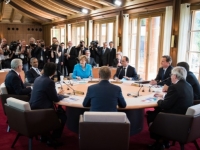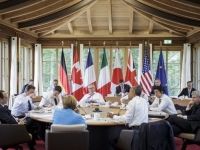Politics
G7 Summit
GERMAN G7 PRESIDENCY

G7 Germany (Source: © 2015 The Press & Info Office - Federal Governme)
USPA NEWS -
The heads of state and government of the Group of Seven (G7) met at Schloss Elmau in Upper Bavaria today. In addition to the global economy and foreign, security and development policy, they where discussing the UN conferences to be held in 2015 as well as the post-2015 agenda.
Other key issues they will be addressing include
Protection of the marine environment, marine governance and resource efficiency,
Antibiotic resistance, neglected and poverty-related diseases, and Ebola,
Retail and supply chain standards, and
Empowering self-employed women and women in vocational training.
The leaders of the G7 countries will also discuss energy security, including as part of the Rome G7 Energy Initiative. In addition, they will continue the ongoing G7 process in regard to development policy.
Protection of the marine environment, marine governance and resource efficiency,
Antibiotic resistance, neglected and poverty-related diseases, and Ebola,
Retail and supply chain standards, and
Empowering self-employed women and women in vocational training.
The leaders of the G7 countries will also discuss energy security, including as part of the Rome G7 Energy Initiative. In addition, they will continue the ongoing G7 process in regard to development policy.
The G7 Energy Initiative for Energy Security was launched at a meeting of the energy ministers of the G7 countries held in Rome in May 2014, at which agreement was reached on more joint measures to boost energy security. The leaders of the G7 countries then approved the principles of and measures under the Rome G7 Energy Initiative at their summit in June 2014.
A community of shared values
The G7 countries have a special responsibility when it comes to shaping our planet's future. As a community of shared values, the G7 must work towards establishing peace and security and ensuring people can live a self-determined life. Freedom and human rights, democracy and the rule of law, peace and security, prosperity and sustainable development are core principles agreed by the G7.
The G7 countries have a special responsibility when it comes to shaping our planet's future. As a community of shared values, the G7 must work towards establishing peace and security and ensuring people can live a self-determined life. Freedom and human rights, democracy and the rule of law, peace and security, prosperity and sustainable development are core principles agreed by the G7.
"The heads of state and government of the G7 do not accept the Russian Federation´s illegal annexation of Crimea. As a community of values, they have therefore decided to hold their meetings without Russia until further notice."
Foreign and security policy
The G7's commitment to pursue a common foreign and security policy is extremely important given the numerous political crises the world over. In March 2014 the G7 declared that a meaningful discussion was currently not possible with Russia in the context of the G8. Since then meetings have continued within the G7 process.
Foreign and security policy
The G7's commitment to pursue a common foreign and security policy is extremely important given the numerous political crises the world over. In March 2014 the G7 declared that a meaningful discussion was currently not possible with Russia in the context of the G8. Since then meetings have continued within the G7 process.
Sustainable economic growth and free trade
The G7 countries are key actors in international economic relations, and as such they carry great responsibility for creating reliable, sustainable and viable global economic conditions. Dynamic and sustainable growth in industrialised, newly industrialising and developing countries is easier to achieve if those countries are agreed on basic issues around economic development, cross-border trade and an effective, prudent financial market architecture.
The G7 countries are key actors in international economic relations, and as such they carry great responsibility for creating reliable, sustainable and viable global economic conditions. Dynamic and sustainable growth in industrialised, newly industrialising and developing countries is easier to achieve if those countries are agreed on basic issues around economic development, cross-border trade and an effective, prudent financial market architecture.
That is why the G7 will continue to work towards establishing an enabling environment that is stable in the long term in order to promote dynamic, sustainable economic growth. Sound finances, open global markets and a well-functioning labour market have a key role to play in that. The G7 states will together continue to promote international trade.
Meetings of G7 Ministers
The following meetings of ministers are planned in the run-up to the summit in Schloss Elmau:
A meeting of foreign ministers in Lübeck on 14/15 April 2015,
A meeting of energy ministers in Hamburg on 11/12 May 2015,
A meeting of finance ministers in Dresden from 27 to 29 May 2015,
A meeting of science ministers in Berlin on 8/9 October 2015, and
A meeting of health ministers in Berlin on 8/9 October 2015.
The following meetings of ministers are planned in the run-up to the summit in Schloss Elmau:
A meeting of foreign ministers in Lübeck on 14/15 April 2015,
A meeting of energy ministers in Hamburg on 11/12 May 2015,
A meeting of finance ministers in Dresden from 27 to 29 May 2015,
A meeting of science ministers in Berlin on 8/9 October 2015, and
A meeting of health ministers in Berlin on 8/9 October 2015.
Dialogue with African nations
The leaders of the G7 intend to support African nations in their reform efforts and thus to lay the foundations for peace and security, growth and sustainable development on the African continent. That is why they will be inviting the heads of state and government primarily of African countries to join them on the second day of the summit. Together with them they will engage in a wide-ranging dialogue on Africa and global policy issues.
The leaders of the G7 intend to support African nations in their reform efforts and thus to lay the foundations for peace and security, growth and sustainable development on the African continent. That is why they will be inviting the heads of state and government primarily of African countries to join them on the second day of the summit. Together with them they will engage in a wide-ranging dialogue on Africa and global policy issues.
Dialogue with civil society
The German Chancellor also plans to hold an inclusive dialogue with civil society in the context of Germany's G7 Presidency. As part of an outreach process Angela Merkel will meet representatives of the scientific community, business and trade unions, as well as non-governmental organisations and young people from the G7 countries.
Source: Daren Frankish Media | Office of the Federal Government - Germany
Photography - Bundesregierung/Gottschalk/Denzel/Kugler
The German Chancellor also plans to hold an inclusive dialogue with civil society in the context of Germany's G7 Presidency. As part of an outreach process Angela Merkel will meet representatives of the scientific community, business and trade unions, as well as non-governmental organisations and young people from the G7 countries.
Source: Daren Frankish Media | Office of the Federal Government - Germany
Photography - Bundesregierung/Gottschalk/Denzel/Kugler
more information: https://www.g7germany.de/Webs/G7/EN/Home_en/home_node.html
Liability for this article lies with the author, who also holds the copyright. Editorial content from USPA may be quoted on other websites as long as the quote comprises no more than 5% of the entire text, is marked as such and the source is named (via hyperlink).








